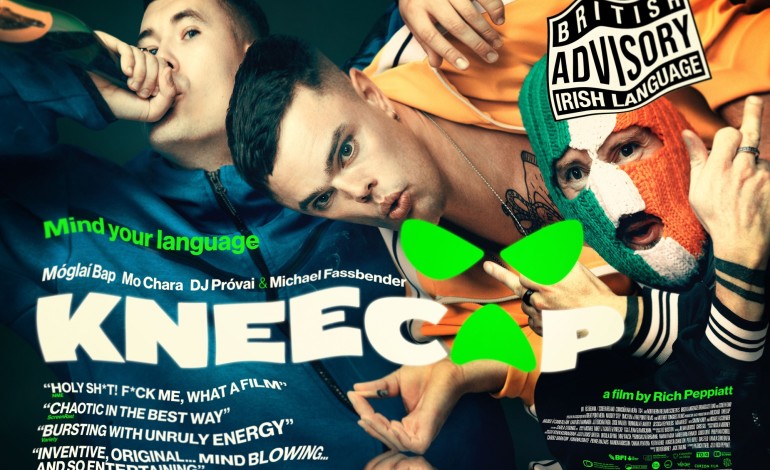
The Irish-language film ‘Kneecap’ has triumphed at the 2024 British Independent Film Awards (BIFA), winning seven awards, including the prestigious Best British Independent Film.
The semi-fictionalised account of the origins of the Belfast rap group Kneecap also claimed accolades for Best Debut Screenwriter (Rich Peppiatt) and Best Joint Lead, shared by its three stars, Liam Óg Ó Hannaidh, Naoise Ó Cairealláin, and JJ Ó Dochartaigh. With 14 nominations overall, the film dominated the awards ceremony held at London’s Roundhouse.
‘Kneecap’ explores themes of language, identity, and resistance in Northern Ireland in such a way that reflects the struggles of minority cultures globally. In the way that great films often do, it threads this narrative of cultural autonomy into a gleefully entertaining, tongue in cheek plot.
The film’s success continues its momentum after its premiere at Sundance, where it won the NEXT Audience Award, and having recently earned Ireland’s submission for the International Feature Film category at the Oscars. It represents a groundbreaking moment for Irish-language cinema and the global appeal of stories rooted in cultural authenticity.
The critical success of the film has not been without controversy. The band’s ethos of Irish unity has rubbed both public and politicians alike the wrong way. They recently won a legal discrimination case against the UK Government over the withholding of funding over a grant from the Music Export Growth Scheme in 2023. Their rise to international attention, including their arrival at the Sundance Film Festival in a graffitied police Land Rover, highlights their skill at blending performance art with political critique. Critics of the band often juxtapose their access to public funding with the struggles of victims of violence during the Troubles, a disparity that underscores the complex socio-political terrain of post-conflict Northern Ireland.
While their conservative critics accuse them of promoting sectarianism and glamorising past violence with their outspoken lyricism and symbolic use of balaclavas, Kneecap’s work embodies a deeper commentary on the enduring scars of imperialism and the struggle for cultural identity in Northern Ireland. Both fans and cultural critics alike view the hip hop group as vital voices of rebellion, challenging both historical and contemporary power structures through their unrepentant art. Their slogans and visual elements, although often tied to Republican imagery, are arguably less a celebration of conflict and more a reflection of a community’s historical fight for recognition and justice. These themes resonate strongly within marginalised groups globally, particularly among those whose languages and traditions have faced systemic erasure, such as Native Americans or Aboriginal Australians. As director Peppiatt noted in his acceptance speech of the Best British Independent Film: “I have to mention there is an irony in the best British film being Irish”
‘Kneecap’ director Rich Peppiatt said in his acceptance speech tonight: “I have to mention there is an irony in the best British film being Irish” https://t.co/hFE8bMI9Vl — Screen International (@Screendaily) December 8, 2024
This irony plays perfectly to the way in which Kneecap’s music and film is not just entertainment; it is a mirror to a society grappling with its past while navigating a path toward a more inclusive future. Their voice is a vital one that resonates, not merely for its boldness, but for the uncompromising protest woven into every Irish language word.
All Awards Won By ‘Kneecap’ at the BIFA’s
Best British Independent Film supported by ScreenUK
Best Debut Screenwriter – Peppiatt
Best Joint Lead – Óg Ó Hannaidh, Ó Cairealláin and Ó Dochartaigh
Best Casting
Best Editing – Julian Ulrichs and Chris Gill
Original Music – Michael ‘Mikey J’ Asante
Best Music Supervision – Gary Welch and Jeanette Rehnstrom
